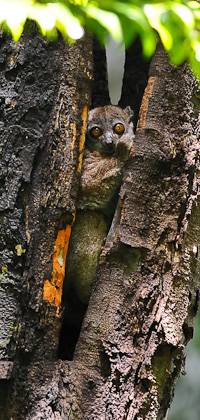 biodiversity is thinning down at a very fast pace C limate change, deforestation, pollution, overfishing, poaching, poverty. All these ills share a common consequence : the disappearance of natural environments all over the planet, and a massive extinction of species. Biodiversity is thinning down at a very fast pace, with three species disappearing every hour, and up to 100,000 per year. At the current speed, it is reckoned that half of the species will be gone before the end of the 21st century. These are frightening figures. Whole sections of our natural heritage, of plants providing cures, of ecosystems purifying our water, of forests holding the soil against landslides are simply vanishing. We are currently experiencing the 6th crisis of massive species extinction that our planet has known, and the fastest of all. many species disappear before we learn about their significance for the survival of mankindThis disaster is made even bigger by the fact that many species disappear before we even discover them, and therefore could have the possibility to learn about their role and significance for a healthy functioning of ecosystems and for the survival of mankind. We don't know yet at which point the damages we inflict on nature will trigger the ecological crash.
biodiversity is thinning down at a very fast pace C limate change, deforestation, pollution, overfishing, poaching, poverty. All these ills share a common consequence : the disappearance of natural environments all over the planet, and a massive extinction of species. Biodiversity is thinning down at a very fast pace, with three species disappearing every hour, and up to 100,000 per year. At the current speed, it is reckoned that half of the species will be gone before the end of the 21st century. These are frightening figures. Whole sections of our natural heritage, of plants providing cures, of ecosystems purifying our water, of forests holding the soil against landslides are simply vanishing. We are currently experiencing the 6th crisis of massive species extinction that our planet has known, and the fastest of all. many species disappear before we learn about their significance for the survival of mankindThis disaster is made even bigger by the fact that many species disappear before we even discover them, and therefore could have the possibility to learn about their role and significance for a healthy functioning of ecosystems and for the survival of mankind. We don't know yet at which point the damages we inflict on nature will trigger the ecological crash.
 the resources dedicated to the study and conservation of biodiversity are insufficientMoreover the resources allocated to the study and conservation of biodiversity are insufficient. At the current speed of new species discovery (around 16,000 new species per year), we would need almost a thousand years to complete the full inventory of our planet's biodiversity. Yet, with natural environments under deterioration at an increasing speed today, what will be left to discover in 1000 years ?
the resources dedicated to the study and conservation of biodiversity are insufficientMoreover the resources allocated to the study and conservation of biodiversity are insufficient. At the current speed of new species discovery (around 16,000 new species per year), we would need almost a thousand years to complete the full inventory of our planet's biodiversity. Yet, with natural environments under deterioration at an increasing speed today, what will be left to discover in 1000 years ?
It is thus vital to speed up research on biodiversity. Unfortunately, beside a lack of funding, there are other hindrances to scientific research in natural environments, one of which being access difficulty. Few scientists are really able to lead missions to places reckoned out of reach, too dangerous We need to move fast and speed up scientific research. It's a race against time.or located in conflict areas. And even if they finally reach these remote places, these so-called «extreme» environments, they then have difficulties working efficiently. So they are eager for chances to go to this kind of places, especially given that these natural habitats, these « Lost Worlds », have never been studied yet even visited, and are often extraordinary biodiversity reservoirs where many discoveries await scientists.








